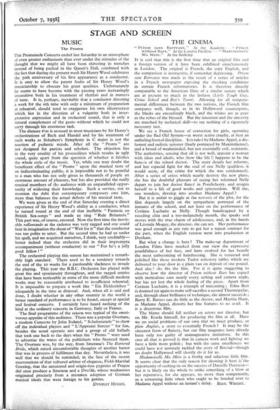THE CINEMA
" Prison sans Barreaux." At the Academy— " Prison without Bars." At the London Pavilion----" Mademoiselle Ma Mere." At the Berkeley
IT is said that this is the first time that an original film and a foreign version of it have been exhibited simultaneously in London. The original is French, the copy English, and the comparison is instructive, if somewhat depressing. Prison sans Barreaux was made as the result of a series of articles in a French newspaper exposing the shocking conditions in certain French reformatories. It is therefore directly comparable to the American films of a similar nature which are at present so much in the fashion (Little Tough Guy, Crime School and Boy's Town). Allowing for all tempera- mental differences between the two nations, the French film compares well, though, as in its Hollywood counterparts, the blacks are exceedingly black, and the whites are as pure as the robes of the blessed. But the intention and the sincerity are matched by technical skill—to say nothing of a rigorously necessary tact.
We see a French house of correction for girls, operating under the Bad Old System—at worst active cruelty, at best an unfeeling frost of discipline. It is ruled by Madame Appel, a dis- honest and sadistic spinster (finely portrayed by Maximilienne), and a brood of weakminded, but not essentially evil, assistants.
The authorities, sensing that all is not well, appoint a woman with ideas and ideals, who (how like life !) happens to be the fiancée of the school doctor. The story details her reforms, and her especial fight for the soul of one Nelly (guiltless, it would seem, of the crime for which she was condemned). After a series of crises which nearly destroy the new plans, she has the doubtful pleasure of seeing her reformed Nelly depart to join her doctor fiancé in Pondicherry, and resigns herself to a life of good works and spinsterdom. Will she, one wonders, develop into another Madame Appel ?
But it is unfair to giggle at the naivetes of the plot, for the film depends largely on the sympathetic portrayal of the inmates of the school, and not least on the performance of Corinne Luchaire as Nelly. Though handicapped by a receding chin and a too-melancholy mouth, she speaks and moves with the true charm of adolescence, and, in the hands of Leonide Moguy, the director, she can act. Her performance was good enough at any rate to get her a repeat contract for the part, when the English version went into production at Denham.
But what a change is here ! The make-up department of London Films have masked from our view the expressive youthfulness of her face, and have evolved for her benefit the most unbecoming of hairdressing. She is veneered and polished like those modern Tudor refectory tables which are delivered to your door in a plain van on deposit of one pound.
And alas ! she fits the film. For it is quite staggering to observe how the director of Prison without Bars has copied with meticulous care nearly every setting and camera angle, but has yet lost the whole feeling of the piece. Apart from Corinne Luchaire, it is a triumph of miscasting ; Edna Best is doomed yet again to make self-sacrifice a second Thermopylae, and, through sheer brilliance of technique, she almost succeeds ; Barry K. Barnes can do little as the doctor, and Martita Hunt, as Madame Appel, distorts her fine features to no avail. It is a disastrous film.
The blame should fall neither on actors not director, but on Mr. Korda himself, for producing the film at all. Have we no social problems of our own that we must produce, en pkin Anglais, a story so essentially French ? It may be the sincerest form of flattery, but our film magnates have already been only too guilty of unimaginative imitations. In this case all that is proved is that in camera work and lighting we have a little more polish ; but with the same excellences we could have not unwisely tackled the story of Borstal—though no doubt Hollywood will shortly do it for us.
Mademoiselle Ma Mere is a frothy and salacious little film. It seems clear that the only reason for showing it here is-the
opportunity of cashing-in on the success of Danielle Darrieux- but it is likely on the whole to strike something of a blow at her reputation, for she appears, no more than competently, as a screaming little vixen who ought to be handed over to Madame Appel without an instant's delay. Bun. WRIGHT.














































 Previous page
Previous page